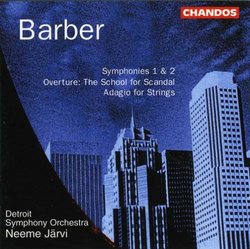| All Artists: Samuel Barber, Neeme Järvi, Detroit Symphony Orchestra Title: Barber: Symphonies Nos. 1 & 2; The School for Scandal Overture; Adagio fort Strings Members Wishing: 1 Total Copies: 0 Label: Chandos Release Date: 10/20/1998 Genre: Classical Styles: Forms & Genres, Theatrical, Incidental & Program Music, Historical Periods, Modern, 20th, & 21st Century, Symphonies Number of Discs: 1 SwapaCD Credits: 1 UPC: 095115968420 |
Search - Samuel Barber, Neeme Järvi, Detroit Symphony Orchestra :: Barber: Symphonies Nos. 1 & 2; The School for Scandal Overture; Adagio fort Strings
 | Samuel Barber, Neeme Järvi, Detroit Symphony Orchestra Barber: Symphonies Nos. 1 & 2; The School for Scandal Overture; Adagio fort Strings Genre: Classical
|
Larger Image |
CD DetailsSimilarly Requested CDs
|
CD ReviewsBarber, a great American Romantic N. Daniele Pietro | Milano, MI Italy | 04/12/2000 (4 out of 5 stars) "This cd has been , to me , a great introduction to the sound-world of this marvelous and misunderstood American composer. I say misunderstood because when I took info on him from some music books, I noticed a certain tendency to treat him like a second-rate Rachmaninov or a one-work composer (Adagio for strings). Only lately a set of fine recordings from A-list artists (Slatkin,Jarvi, Shaham/Previn)began to show Barber's richness of inspiration. The problem is (in my opinion) that he was a composer concerned about lyricism and melody in a time when those things were not (unfortunately) "in fashion" anymore. This excellently selected cd gives a comprehensive idea about what Barber's music is all about : perfectly crafted, utterly refined music, imbued with a sort of dignified melancholy that never (if correctly performed) falls into self-indulgence. Maybe he was not a colossus, but it's profoundly humane, emotionally wide-ranging music. Still, it's not weak stuff, because his music occasionally shows unexpected, "Stravinskian" astringencies ("Capricorn "concerto"). Jarvi's performances did not receive rave reviews from the critics, but, if I agree about a slight lack of excitement (after this I bought Slatkin), I think that there's nothing really wrong here : the forever wonderful Adagio is hushed and not rushed, "The school for scandal" is appropriately sparkling and the symphonies really shine in their melodic richness. The 2nd is the best performance and (for me) the best piece.It's a rarely heard work because Barber withdrew it, and only recently the score reappeared. It's a measure of Barber's insecureness that he wanted to destroy such a magnificent work : just try the beginning of the last mov., it's an amazing, thrusting "fugato" ! A definite plus of the cd is the Detroit Symphony which, as splendidly recorded by Chandos, provides a rich , warmily glowing sound. Then, if you want more Barber, I also recommend Slatkin (Rca and Emi) which has greater focus and concentration in the 1st symphony and is splendid in the Essays for orchestra(no 2nd symphony from him, though!). In any case this one is not going to short-change you." Barber And The Romantic Side Of American Music Erik North | San Gabriel, CA USA | 05/17/2005 (5 out of 5 stars) "If Aaron Copland embodied the America of small towns, wide open spaces, and the can-do spirit, Samuel Barber embodied its more Romantic side--not so much in terms of Romantic love, but in the scope of the music he created. This recording here of four of Barber's works clearly shows him to be our nation's finest exponent of 20th century Romantic American music. The one-movement Symphony No. 1 was a work championed extensively by conductors like Artur Rodzinski and Bruno Walter after its 1936 premiere, while the Second Symphony, which he composed in 1942, was a work the composer was so critical of that he ordered the work removed twenty years later; it would not be heard in concert halls until a few years after his death in 1981. Both works are full of inspired orchestration, very austere, and still relatively obscure surprisingly enough, despite the many recordings out there. In a lighter vein is Barber's concert overture inspired by Richard Sheridan's 1777 play "The School For Scandal." Beginning with an orchestral flash that for a moment has "Flying Dutchman" overtones, the work then proceeds through brilliant orchestral colourings. Then, there is the much-beloved "Adagio For Strings", which the composer took from his 1937 String Quartet No. 1 and which became one of the first American works ever heard at the world-famous Salzburg Festival. Setting aside the fact that it has been used in films like THE ELEPHANT MAN and, especially, PLATOON, the Adagio is often heard during times of deep mourning, first during Roosevelt's funeral in 1945 and then in 2001 for the victims of the 9/11 attacks. Even today, nearly seven decades after it was first heard, it is one of those pieces that readily identifies our nation in musical terms. All four works are superbly performed by the Detroit Symphony under Neeme Jarvi, who served as its music director from 1990 to 2004. Though born in Estonia, during his tenure in the Motor City, Jarvi has shown a great appreciation for the music of America, both well-known and obscure, and his abilities have kept up the traditions set down in Detroit by his predecessors Paul Paray and Antal Dorati. The two Barber symphonies and the overture are perfomed very dynamically by the orchestra, while the orchestra's full string section gives the Adagio the incredibly poignancy it embodies. A great recording all around, definitely one to own." Amazing Barber J. Rich | 03/01/2009 (5 out of 5 stars) "Although conductor Neeme Jarvi really isn't viewed as a conductor of American classical music, I think it's safe to say with this release from Chandos that he has secured his place among Samuel Barber enthusiasts. The Detroit Symphony Orchestra do a great job in pushing these performances to their creative peaks.
Barber's two symphonies are given an excellent reading with great dynamic contrasts being made throughout the pieces and also the lush and pristine sound quality of Chandos really adds to the great atmosphere that this music produces. "The School For Scandal Overture" and "Adagio for Strings" are also given great readings. Each repeated listening reveals yet another facet of Barber's rather enigmatic style: a unique approach to harmony. If you like Barber, then also check out Leonard Slatkin's, Thomas Schippers', and Marin Alsop's interpretations of Barber's work, but I believe you will be hard pressed to find any better readings than that of Neeme Jarvi and the Detroit Symphony. Be sure to also check out the other Barber releases on Chandos with Neeme Jarvi. If you love Barber, you will not be disappointed." |

 Track Listings (6) - Disc #1
Track Listings (6) - Disc #1

